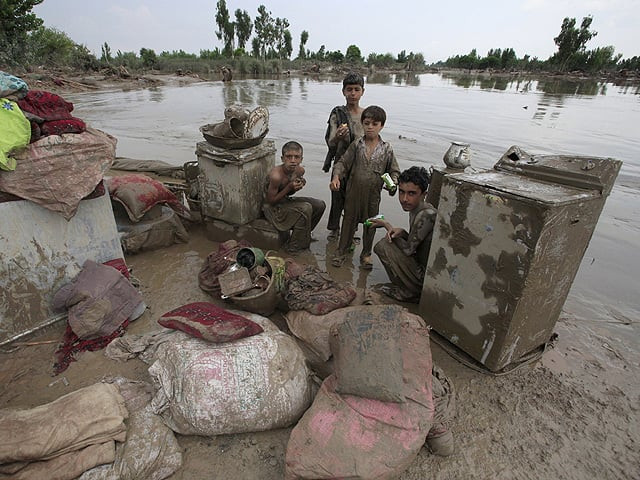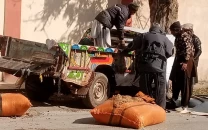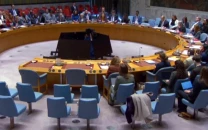Dashed hopes at Nowshera
Pari Bibi’s doleful countenance suddenly lights up with glee as she catches sight of me approaching the camp.

Dashed hopes at Nowshera
Within seconds, I am surrounded by more flood victims showing off their NICs and petitioning if I can at least lend them a water cooler. It’s only after I tell them that I am from the media that they step back.
This is Khandar relief camp set up for Nowshera flood victims inside a government college which looks nothing less than a khandar (ruin) at this point.
As the floods moved south to the province of Sindh, relief workers have also moved forward, leaving behind locals in this small district crying for help.
With no official help coming their way, victims at the camp in Government College of Technology, Nowshera, look at every outsider with pleading eyes.
The college was one of the few buildings that braved the Nowshera flood. It is unlikely though that post-summer classes will resume here any time soon, as their college premises have been serving as a temporary relief site.
It currently houses over 1,000 displaced people from nearby villages in 210 tents, but official records only show 567. With limited tents and food supplies, most people are living in foul conditions at the college premises without any food or shelter.
The fortunate ones who got there in time managed to occupy the classrooms in the college where students’ desks have been turned into beds. The rest who followed went to tents pitched in the college playground, while others sought shelter in the open ground and are still waiting for their turn to receive mats and water coolers. Others complained of being in the same clothes for nine days.
So far, only private relief workers have been sending in food and water; the government is nowhere to be seen. The local provincial deputy Liaquat Shabab, a PPP loyalist elected from PF-14, is yet to visit his constituency. The army, however, is paying occasional visits to the camp.
But locals say they are not taking care of them as they did in the first three days. Now they only see relief trucks coming in and heading to the college’s store room. Since the relief supplies are mostly covered, people are not sure whether it is food and even less sure who it is intended for.
This is the worst flooding in the district in the last nine decades, say locals. And also possibly the worst treatment we have received so far, they add.
The intense flooding on July 29 washed away hundreds of houses on either sides of the Kabul River that divides Nowshera into two parts – the Nowshera City and Cantonment. With no timely help available, the raging torrents swept away houses within minutes, ruining dozens of villages.
In some cases, people died of starvation because they were stranded on rooftops for days.
Initially, about 30 helicopters came to the rescue but only a few villagers were saved. The rest were stranded on their rooftops for days, say victims. One of them, Mohammad Mushtaq Swati, added that he saw army helicopters around the Nowshera cantonment who were more concerned about rescuing the local deputy Liaquat Ali Shabab’s belongings from his house rather than people from nearby villages.
Swati, a painter by profession, is one of the unfortunate people who found his father’s corpse three days after the flood water receded. “He rushed to the rooftop probably to save himself, but died of starvation there because no one came to help.”
The situation is no different at the camp where victims are not being offered food without their NICs. “How can they expect us to bring our NICs when all our belongings were washed away?” asks Sultan Shah.
But officials say that is a requirement, because some victims end up taking more food, while others are left to starve. “Every time the food arrives, they fight like dogs. We need to organise them because we have limited food and water supplies,” says the camp administrator, Noor Akbar. The registration process has also begun, according to him. Pointing to a banner at one end of the college, he says I should visit the desk behind it. Although the flood victims warned me that the official was lying, I decided to check, only to find no one there. Needless to say, Akbar was nowhere to be found either.
Life for senior citizens and single women is even worse. They are unable to fight for their share every time a relief truck drives into the college premises.
“First, nature killed us with floods, now the government wants us to die of starvation,” says a toothless Rayjhun, who lost one of her sons in the flood. “One of them died and the other, I hear, is at a camp in Mardan but he still hasn’t contacted me so I don’t know if he is safe.”
Timely warning
Most victims at the camp were also angry with officials of the meteorological department who failed to issue a flood warning in time. “We were at work when some locals came running to us asking us to close our shops and rush home if we wanted to save our wives and children,” adds Adnan.
A large number of them managed to save their lives by walking a few kilometres up to the Nowshera city, but regret losing their belongings.
Shah, who is a father of three daughters, was particularly upset over losing the new furniture and jewellery in the flood that he had bought for his daughter’s marriage on August 4.“It was worth 1.5 million! What am I going to do now? How will I save so much money again?” he asks.
There are others who are mourning the loss of their crops and livestock that they couldn’t save. In fact, since the water receded four days ago, they have been visiting their village every day. “I don’t know where to begin from. I lost my daughter, my house was swept away and so were my four buffalos – how am I going to start my life again? I just want to be left alone at this camp,” said a Nowkali Mohalla resident.
‘Where is the Nowshera administration?’
The college also houses a medical camp in one of the classrooms set up by doctors of the Mardan health department, who have been questioning the absence of the Nowshera government.
Dr Abdul Latif from Mardan tells me that he visits the camp every other day but has not met any official from the Nowshera health department yet. “I can’t believe that all the medical professionals in Nowshera died in the flood. There was mostly physical destruction in this area, majority of the lives here were saved. So why has any doctor paid a visit to any of the relief camps?” he asks.
The camp, he adds, is receiving at least 800 patients daily but there are few medical professionals to cater to them as a result of which communicable diseases such as skin infections and bacterial conjunctivitis are fast spreading in the area. Gastroenteritis is another major concern, adds Dr Latif. Inadequate sanitation facilities are only “creating more patients,” he says, adding that men and women are compelled to use the same restroom.
Flood victims say they have not seen a government sweeper since they arrived at the camp, let alone a public health official.
“First, they said that floodwaters had been hampering rescue efforts, but now that the water has receded, there is no reason for the government to neglect us,” says Shah.
Shah had a point, I later thought to myself until I read about the prime minister’s appeal for international aid for flood victims wondering whether any of this aid will trickle down to these villagers of Nowshera.
Published in The Express Tribune, August 9th, 2010.


















COMMENTS
Comments are moderated and generally will be posted if they are on-topic and not abusive.
For more information, please see our Comments FAQ